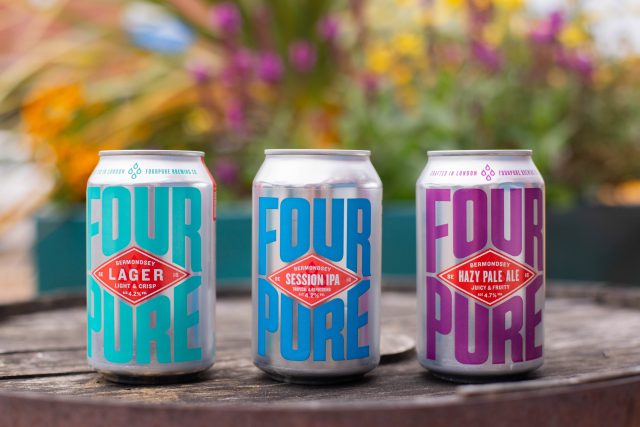Fourpure site closes with brewing shifted to Magic Rock
In Good Company will close Fourpure Brewing Co’s production site and taproom in Bermondsey and will brew its beer at Magic Rock Brewery in Huddersfield from mid-September.

The decision to relocate and consolidate the business has been made to future proof the brand, according to In Good Company, which cited this as a “challenging time for the craft beer and hospitality industries”.
In Good Company has said that the consolidation will mean “a significant increase in capacity in Huddersfield, as well as growing the brewing team on the ground at that location – ensuring continuity in supply of the well-established range of Fourpure products”.
Added to this, In Good Company is now “actively looking for a new home for the brand in the capital”.
Speaking about the decision, In Good Company’s CEO Steve Cox, said: “It is with huge sadness that we’ll leave the brewery and taproom that has been Fourpure’s home since 2013. The decision to relocate is one of the commercial realities we face in order to safeguard the Fourpure brand for the future, as well as allowing the business to grow and innovate. We are confident that it is the right move in these circumstances, and we are lucky to already have a state-of-the-art brewing facility at Magic Rock in Huddersfield, meaning there is very minimal impact to production.”
Cox explained: “As well as ensuring delivery of all commitments to our customers and partners, our absolute priority is to protect jobs. Staff on our London brewing team will obviously be affected by this decision and there will be opportunities for certain roles to relocate to Huddersfield as part of the expansion of that site, however we appreciate that this won’t be possible for everyone.”
Cox added: “Our wider team based in London, who are not physically involved in the brewing or the taproom – including the sales, marketing and finance teams – will be unaffected.”
Alcohol-free brewer Big Drop recently entered into a licence agreement with In Good Company, having stated that the move was part of its plans “to significantly scale its business and facilitate global growth ambitions”.
Last spring, the Society of Independent Brewers (SIBA) reinstated Magic Rock and Fourpure as members — a first for the organisation — after their sale from Kirin Brewery Company subsidiary Lion meant they could claim back their independent status.
Lion sold Fourpure and Magic Rock to Kent-based Odyssey Inns back in August 2022 after having only acquired it in July 2018 and having said at the time: “You’re also probably expecting “business as usual”, “nothing will change”, “more of the same”. Whilst the beer and the culture and the people will be the same…we truly hope that you will see some change, otherwise why would we bother?”
Partner Content
The sale, which included the breweries and taprooms in London, Huddersfield and Holmfirth and the Little Creatures craft beer hospitality venue in Kings Cross, was as a result of Lion’s intention to focus more on its businesses in Australia, New Zealand and the US.
Fourpure’s journey as a brewery over the past year has been rumoured by industry insiders to be “muddled”, with some claiming that the brewery was still advertising for staff at its Bermondsey site this month. Plus, earlier in the year, the brewery added two new pale ales to its line-up for a limited time in an effort to get beer fans “excited” by its range.
The proportion of UK breweries which entered insolvency in 2023 grew by 82% in 2023, rising from 38 in 2022 to 69 by the end of December, according to audit firm Mazars.
Using figures from the Insolvency Service, the company discovered that a large number of the beleaguered breweries were smaller craft brands hit by the rising costs of production, duty and inflation.
Included in the figures are some of the breweries picked up by private capital firm Breal Group, which has rebranded as Keystone Brewing. These include Black Sheep Brewery, Brew By Numbers, Brick Brewery and Purity Brewing.
Most recently, Keystone has undertaken a number of redundancies at Black Sheep, which, according to the private equity firm, were needed to be made due to the “enormous challenges” faced by the sector, noting that “efficiency measures are essential”. This was timed with the group pushing a major rebrand for the Yorkshire brewery involving new labelling and packaging along with marketing and PR in the refresh sent to press.
The one bright spark in the craft brewing landscape was the saving of legendary Leeds company North Brewing, which was acquired by Kirkstall Brewery, after North had originally stated that administrators were due to be appointed.
According to Steve Dunkley, head brewer at Beer Nouveau who has been keeping a comprehensive list of brewery closures, more than 80 breweries went bust in the UK in 2022, significantly more than reported by Mazars.
Dunkley told db: “The problem with a lot of lists is that they pick a singular source of information, such as Companies House, or insolvency applications. A lot of breweries aren’t registered with Companies House for instance. A lot don’t go through administration or insolvency. This list pulls from multiple places including direct from brewery’s social media posts.”
The number of craft breweries going bust jumped to catastrophic heights as early as back in 2022 with the issues outlined as a myriad of rising costs and weakening consumer demand.
Related news
Carlsberg Hong Kong expands no and low alcohol portfolio




